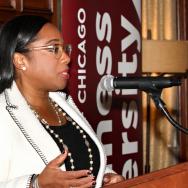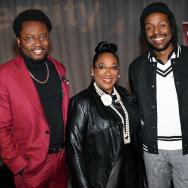The University of Chicago’s annual Professional Services Symposium offered a welcome departure from the typical diversity, equity and inclusion programs that financier Cynthia DiBartolo has attended, which she said often aren’t as robust as they purport to be.
Her firm was one of the 27 invited to the 14th annual event to showcase the capabilities and capacity of their business to leaders at UChicago, UChicago Medicine and the Obama Foundation.
“That’s the difference I noticed immediately,” said DiBartolo, the founder and chief executive officer of Tigress Financial Partners, the nation’s only disabled and woman-owned financial services firm. “First of all, this is not a reactive meeting. It’s a proactive symposium. That’s to the credit of the University. It speaks to the culture. Culture drives behavior. Behavior drives performance. And performance drives results.”
Held in downtown Chicago and on campus in November, the event drew participants from diverse legal services, money management, financial services, communications, information technology and human resource services enterprises. They discussed specific, potential professional service opportunities with matched University officials.
“These were actual meetings; they were not pitches. Everyone is sitting around the conference table having dialogue, conversations and building relationships,” said Nadia Quarles, assistant vice president of UChicago’s Office of Business Diversity. “This program is distinguishable because it’s the first of its kind that’s not procurement/supplier/buyer-driven. They are driven by relationships with vice presidents and high-level decision-makers within our organization.”
The symposium has produced remarkable results, with the University now spending $200 million with more than 100 minority- and woman-owned professional services providers, according to Quarles. She said the event’s success reflects how “business diversity and inclusion is ingrained” in the culture at UChicago.
At a reception held at the Gordon Parks Arts Hall, President Paul Alivisatos thanked Quarles and University Trustee John W. Rogers Jr. for their efforts in expanding the symposium and said the University will continue to find opportunities to build partnerships with business leaders.
“We have always been a university that’s been committed to shaping and defining new fields of knowledge and to transformative education. But, also, we are a university that seeks to engage in partnership with society in order to help work on some of the most important opportunities and challenges,” Alivisatos said. “This fits into that in such a beautiful way, our ability to work closely with great business leaders.”
Tiffany Keaton attended the symposium as an observer seeking to learn more and draw inspiration from the model for her work as a senior manager of business diversity and supply chain sustainability with TIAA.
“We have a robust program at TIAA,” Keaton said. “However, we’re always looking for ways to improve. The symposium format offered a new perspective and considerations for how we might enhance our program. Particularly interesting to me was the face time business owners had with the decision-makers. Over the last 14 years, this appears to have resulted in real impact for diverse businesses.”
The opportunity to sit across the table from real decision-makers was something invitee Jason Torres appreciated about the symposium.
“They were asking buying questions and not disqualifying questions,” said Torres, founder and general partner of Sana Capital, based in New York, N.Y. “If you want to say no, there’s always a reason to say no. You’ve just got to keep asking questions until you get to no, and then you can say, well, that’s the reason why it’s no. Just keep asking questions.
“You can look at any manager, any investment that they’ve made, and there’s reason to say no, to anyone. But they found a way to say yes, and those are the types of questions that they’re looking to answer and to identify around these principles.”
Later in the night, Quarles held a fireside chat with IT entrepreneur Wheeler Coleman, CEO and executive partner at EC-United, who shared his experiences and relationships with the University of Chicago and the procurement space for diverse businesses. He addressed problems with compensation parity for diverse businesses, the importance of technology in minority communities, and how his firm extends technology opportunities within communities that may have impediments to them.
“We hire young engineers with maybe a couple of years or five years of experience under the belt, and we pair them with our senior engineers,” he said. “So, our engineers are not only learning about technology but they’re also learning about business. And they’re learning how to sell from seasoned veterans. We’re talking about people with three, four decades in the field. We’re trying to elevate our young talent to educate them not only about technology but about business and about selling.”
During the reception, Quarles presented the John W. Rogers Jr. Business Diversity Impact Award to Mark Fehlberg, assistant vice president for procurement and payment services at UChicago.

